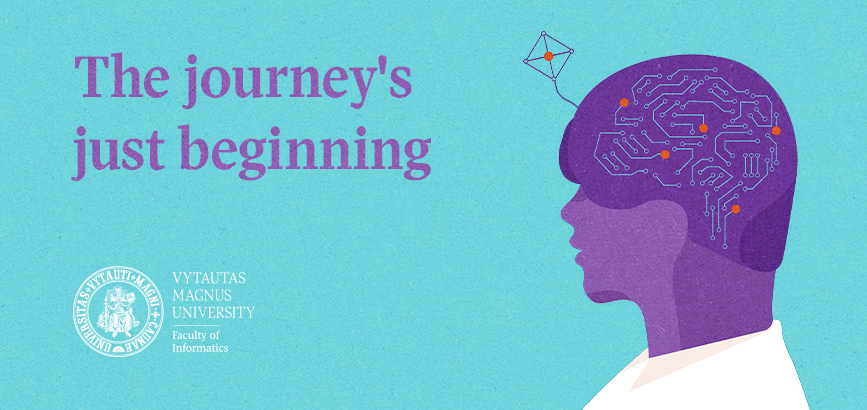#VMUif and LGDA Game Night
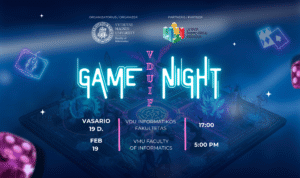
Missed us? We missed you too!
This time, we’re raising the bar. We’re teaming up with the Lithuanian Game Developers Association, which means one thing: the evening is getting a serious upgrade!
Grab your friends and spend February 19 enjoying an evening of board and PC games.
See you there
- February 19, 5:00 PM
- VMU Faculty of Informatics (Universiteto St. 10, Akademija, Kaunas district)
Important info
- REGISTER FOR THE EVENT by February 17 – this will help ensure there are plenty of snacks and drinks for all!
- Feel free to bring your favorite board game.
Registration
Please note that the event will be photographed and/or filmed, so you may appear in event photos or videos that could be published by various media outlets.
The event is free of charge!
VMU to Hold Graduation Ceremonies
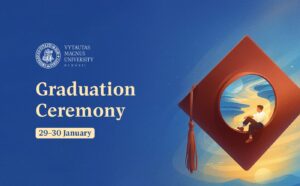
On 29-30 January, Vytautas Magnus University (VMU) invites graduates to participate in festive graduation ceremonies.
Vytautas Magnus University’s diplomas will be solemnly awarded to the graduates in the premises of VMU.
Programme of the graduation ceremony:
THURSDAY, 29 JANUARY
FESTIVE HALL OF VMU EDUCATION ACADEMY | T. ŠEVČENKOS G. 31, VILNIUS
11 a.m. Graduation ceremony for Bachelor’s degree programmes and Teacher Retraining Modular Studies of VMU Education Academy.
FRIDAY, 30 JANUARY
FESTIVE HALL OF VMU AGRICULTURE ACADEMY | STUDENTŲ G. 11, AKADEMIJA, KAUNO R.
11 a.m. Graduation ceremony of the Faculty of Bioeconomy Development of VMU Agriculture Academy.
VMU AULA MAGNA | GIMNAZIJOS G. 7, KAUNAS
12 p.m. Graduation ceremony of the Faculty of Catholic Theology.
VMU GREAT HALL | S. DAUKANTO G. 28, KAUNAS
1 p.m. Graduation ceremony of the Faculty of Economics and Management, Faculty of Humanities, Faculty of Informatics, Faculty of Arts, Faculty of Political Science and Diplomacy, Faculty of Social Sciences, and Faculty of Law. Graduation ceremony for Bachelor’s and Master’s degree programmes, and Teacher Retraining Modular Studies of VMU Education Academy.
We would like to inform you that the event may be filmed and/or photographed, and you may appear in event photos or videos that could be published across various media platforms.
Join us for AI TRENDS
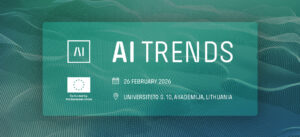
VMU Faculty of Informatics and VMU STEAM Didactics Centre Started the International Erasmus+ KA220-HED Project AIGuide
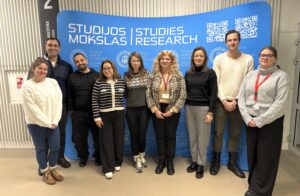
VMU Faculty of Informatics and VMU STEAM Didactics Centre started the international Erasmus+ KA220-HED project AIGuide – Artificial Intelligence for Green Understanding, Insights & Decision Empowerment, coordinated by Vytautas Magnus University.
The project aims to strengthen the use of artificial intelligence in higher education, with a particular focus on sustainable, responsible, and data-informed decision-making within STEAM education. AIGuide brings together an international consortium of partners from Turkey, Greece, Hungary, and Lithuania, fostering cross-country collaboration between universities and organisations.
On 13-14 January 2026, the first transnational project partner meeting was held at the Faculty of Informatics of Vytautas Magnus University. During the meeting, consortium members aligned on project management and implementation principles, discussed the structure and objectives of the work packages, and agreed on the upcoming milestones and activities.
Key discussions focused on the integration of AI-based solutions into higher education curricula, the development of training modules and digital learning resources, the creation of an open-access e-learning platform, and the active engagement of the academic community. The project also highlights the importance of equipping students and educators with competencies to apply artificial intelligence in addressing environmental sustainability challenges.
The AIGuide project will contribute to the development of innovative teaching and learning practices at Vytautas Magnus University, including activities at the VDU STEAM Centre, while promoting ethical, research-based, and responsible use of artificial intelligence in higher education.
The project is funded by the European Union under the Erasmus+ programme.

VMU Faculty of Informatics Students Successfully Defended Their Final Theses
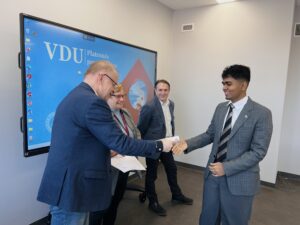
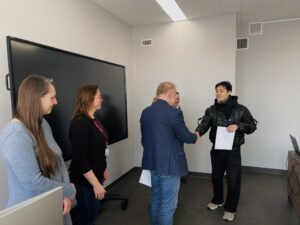
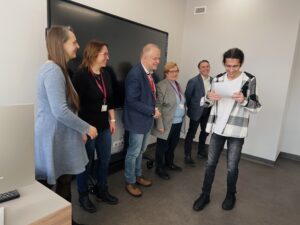
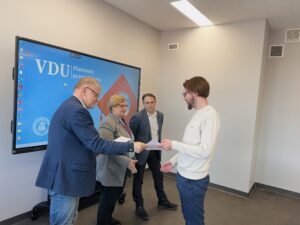
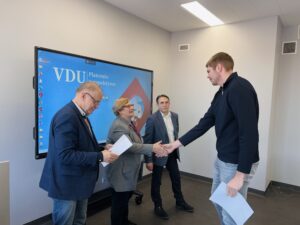
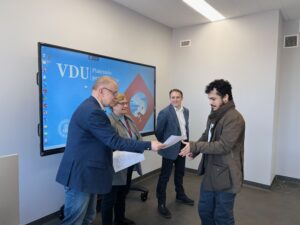
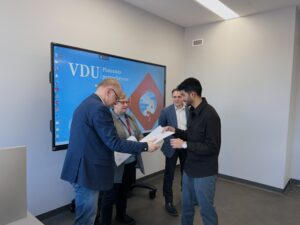
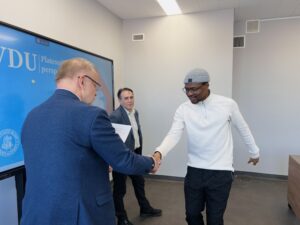
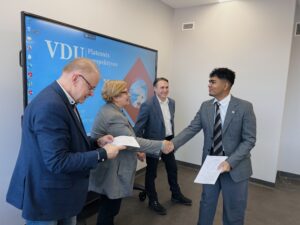
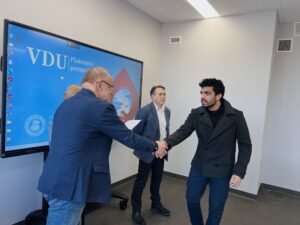
Open Invitation: Final Thesis Defenses
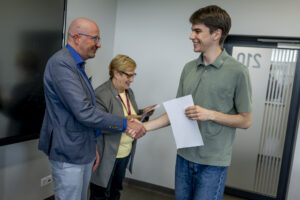
Vytautas Magnus University Faculty of Informatics invites you to attend the public defenses of Bachelor’s and Master’s final thesis on January 12, 2026.
Defense Schedule:
Bachelor’s Degree Programme:
- Information Systems – January 12, 2026 (Monday), 12:00 PM, Room 205.
Master’s Degree Programme:
- Applied Informatics – January 12, 2026 (Monday), 10:00 AM, Room 205.
The final thesis defenses are open to everyone, offering a great opportunity for students, academic staff, and anyone interested in IT to see what our students have been working on.
Applications Now Open for HUB Leaders at SustAInLivWork Centre of Excellence

SustAInLivWork Centre of Excellence has officially launched the call for applications for HUB Leader positions.
Interested candidates are encouraged to apply and become part of a dynamic ecosystem focused on sustainable innovation, artificial intelligence, and societal impact.
Looking for a Career in Programming? Dassault Systèmes is Offering You an Internship Opportunity!
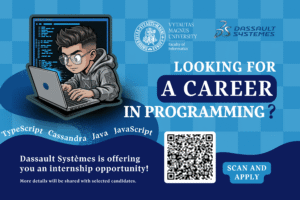
If programming feels like a breath of fresh air to you, good news – we’ve got just the thing for you!
Dassault Systèmes is looking for a curious and motivated student ready to join a team of IT professionals and see how things work in real-world practice.
You don’t have to be a pro – having a basic understanding of Java, Cassandra, JavaScript or TypeScript and a genuine drive to grow is more than enough.
Interested? Fill out the form: https://forms.office.com/e/cn6LWJ8sNW
Details about internship tasks
More information will be shared with selected candidates.
New VMU IF team lineup
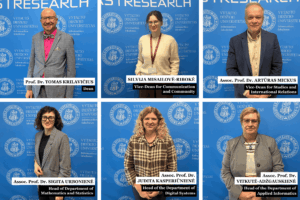
The VMU IF team is made up of people who work every day to build a stronger, more modern, and more open faculty. We invite you to meet the full VMU Faculty of Informatics team!
- Dean – Prof. Dr. Tomas Krilavičius
- Vice-Dean for Communication and Community – Silvija Misailovė-Ribokė
- Vice-Dean for Studies and International Relations – Assoc. Prof. Dr. Artūras Mickus
- Head of the Department of Mathematics and Statistics – Assoc. Prof. Dr. Sigita Urbonienė
- Head of the Department of Digital Systems – Assoc. Prof. Dr. Judita Kasperiūnienė
- Head of the Department of Applied Informatics – Prof. Dr. Daiva Vitkutė-Adžgauskienė
We wish the team inspiring success and challenges that encourage growth. May the workload never overshadow the passion for what truly matters!
Visit to EduGame Partners in Albania
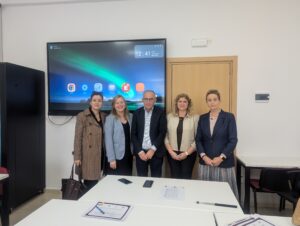
During the last week of October, representatives from Vytautas Magnus University, Dovilė Kuizinienė and Judita Kasperiūnienė, visited EduGame project partners in Albania.
The visit included meetings at the University of Tirana and the University of Elbasan “Aleksandër Xhuvani”. During the discussions, participants reflected on the progress and results achieved within the EduGame project, shared experiences from project implementation, and explored new opportunities for future collaboration and joint initiatives. Moreover, during the visit, meetings were held with Prof. Dr. Mark Marku, Dean of the Faculty of History and Philology at the University of Tirana, and Elvira Fetahu, Rector of the University of Elbasan “Aleksandër Xhuvani”.

The meetings provided a valuable opportunity to strengthen the partnership between institutions, exchange ideas on innovative educational approaches, and plan upcoming project activities.
Activity agendas from the visit are attached below:




